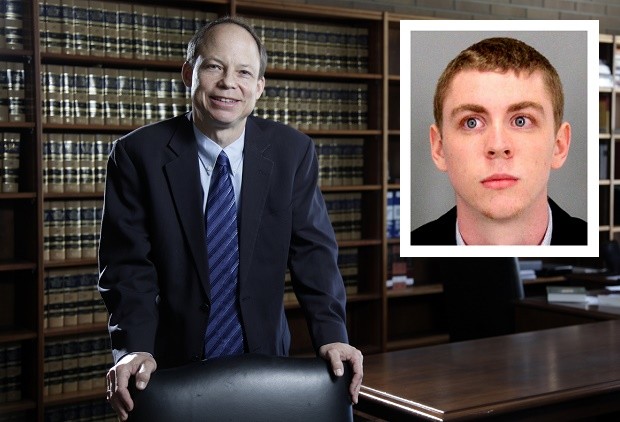Sex case puts spotlight on rape culture at US campuses

This June 27, 2011, photo shows Santa Clara County Superior Court Judge Aaron Persky, who drew criticism for sentencing former Stanford University swimmer Brock Turner (inset) to only six months in jail for sexually assaulting an unconscious woman. The swimmer’s father, Dan Turner, ignited more outrage by writing in a letter to the judge that his son already has paid a steep price for “20 minutes of action.” JASON DOIY / THE RECORDER / AP
LOS ANGELES, United States — A high-profile sex assault case in California reverberating across the globe has prompted soul searching in America and reignited a debate about rape culture on US college campuses.
The case burst into the spotlight after the victim made public a powerful letter to the judge who sentenced her attacker — 20-year-old former Stanford University student Brock Turner — on June 2 to six months in jail on three felony convictions.
READ: Stanford University sex attack sparks outrage | A Letter for the Stanford Rape Survivor
Her harrowing 12-page account of the January 2015 assault and its impact on her life — read in court before the sentencing — lit up the Internet within hours of being posted online, drawing a global chorus of outrage at the light sentence and prompting calls for the judge to be removed from the bench.
“You don’t know me, but you’ve been inside me, and that’s why we’re here today,” she told her attacker in the statement read in court. “You took away my worth, my privacy, my energy, my time, my intimacy, my confidence, my own voice, until today.”
Article continues after this advertisementA letter to the court by Turner’s father, stating that the blond, blue-eyed former Stanford University swimmer did not deserve to be jailed for “20 minutes of action,” further stoked the debate about race and privilege.
Article continues after this advertisementOn Friday the court handling the case took the extraordinary step of releasing to US media 471 pages of documents indicating that Turner lied in portraying himself as a small-town boy led astray by the party culture on campus. The court documents depict him as a regular drinker and hard drug user, with a penchant for making unwanted advances to women.
Turner, who is being held in a county jail in San Jose, California, has been moved to protective custody out of fear for his safety. On Friday, he was banned for life from competing in national swim competitions.
The furor reached the nation’s capital with Vice President Joe Biden praising the unnamed victim as a “warrior” and saying her text should be made required reading for young men and women alike.
The Turner case is seen as particularly emblematic of the way rape assaults are handled on US campuses, where observers say lax policies have created a climate of impunity and discouraged victims from speaking out, especially when sports stars are involved.
‘Still didn’t get justice’
“In general, colleges and universities have done a really bad job at managing campus sexual assault, preventing it or responding to it when it occurs,” said Michele Dauber, a Stanford law professor spearheading a campaign to have the judge in the assault case recalled.
Dauber, who is a close friend of the 23-year-old California woman targeted in the assault, told AFP the six-month sentence given to Turner — who is expected to serve only three months in county jail — downplays the seriousness of rape.
“Here we have the ‘perfect’ victim who did everything ‘right’, going to the police, making a formal charge and subjecting her body to the rape exam. She even had witnesses… and she still didn’t get justice,” Dauber said.
“The message this case is sending is ‘Don’t bother calling the police, you won’t get justice’.”
According to the National Crime Victimization Survey, about one in six women in the United States are victims of sexual assault.
A 2015 study by Brown University found that more than one in every six women are raped during their first year at college while too drunk or incapacitated to fend off their attacker.
The majority of college-age victims — about 80 percent — knew their attacker, surveys show.
Amy Ziering, producer of the 2015 campus rape documentary “The Hunting Ground,” said if anything, the Stanford case had cast the spotlight on the issue as never before.
“It has really, really raised everyone’s consciousness in a way somewhat unprecedented,” she told AFP.
“You have 14 million people in five days reading someone’s letter online and responding to it, and that is something I’ve never seen in my lifetime,” she added. “This has actually ignited a conversation I just have never seen.
“It has prompted a debate about privilege, entitlement and the criminal justice system.”
At Stanford University, the case has also drawn outrage among some faculty and students who have accused the school of a lack of sympathy toward the victim.
“The university has still not apologized to her or expressed any compassion toward her,” Dauber said. “They instead praised themselves about how they did everything right.”
Two student-led petitions circulating online have questioned the university’s response and urged the school to release the names of students responsible for sexual assault or misconduct. Protests are also planned at Stanford graduation ceremonies on Sunday.
Stanford officials did not reply to a request for interviews, referring to statements in which they defended their handling of the Turner case and denounced “misinformation” about the university’s role.
“Stanford University did everything within its power to assure that justice was served in this case,” a statement said, citing a quick police response and referral to prosecutors.
Filmmaker Ziering meanwhile said she was confident the outcry would lead to change in the way rape victims are treated and often shamed into silence.
“This case is the epitomy of rape culture in our society,” she said. “What is hopeful to me about it, is everything that has happened in the aftermath.”